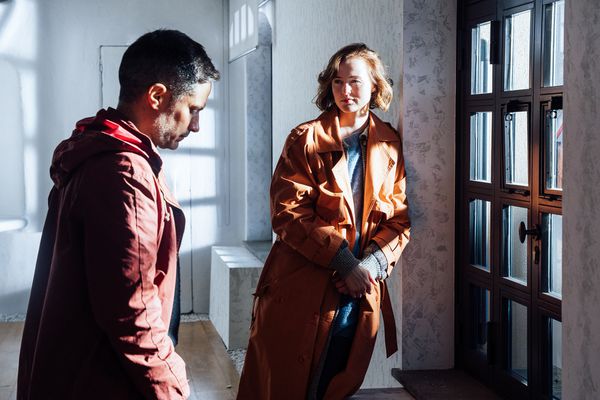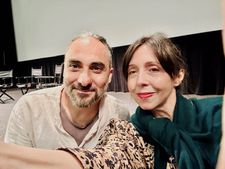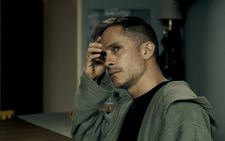 |
| Sal (Gael García Bernal) with Zoe/Ava (Renate Reinsve) in Piero Messina’s Another End |
Piero Messina’s Another End, starring Gael García Bernal, Renate Reinsve, and Bérénice Bejo circles around a big what if. If you could bring back those you love, what would that look like? From the mysterious start onwards - the shower head, the herbal tea, a cookie with lemon peel, a husband taken from an apartment to a hall of stretchers where people rest like larvae or caterpillars, ready to transform to the haunting tune of Dean Martin crooning “Non Dimenticar” - Another End (a highlight of the 23rd edition of Cinecittà and Film at Lincoln Center’s Open Roads: New Italian Cinema in New York) casts a spell to investigate the power of memory. Shot in part at La Défense, west of Paris, the film’s future setting is very much constructed from a present wrangling with meanings of human identity.
 |
| Piero Messina with Anne-Katrin Titze on his choice of Dean Martin’s Non Dimenticar: “The song allowed me to be playful with the very genres that I’m evoking…” Photo: Anne Katrin Titze |
“I don’t look at the absent one’s memories, I only manage them,” is how Ebe (Bérénice Bejo) explains her lab job to her brother Sal (Gael García Bernal). The company called Aeterna employs “hosts” who perform other people’s memories according to strict rules. The absent ones can never find out that they are deceived or they won’t recognise themselves in someone else’s body. Renate Reinsve is credited as both Zoe and Ava, one of them a host, the other Sal’s wife, whose research for a book asks how diets modify pathologies in different parts of the world, as when Europeans came to embrace the domestication of animals, boosting resistance to diseases.
An optical illusion that can be seen as either a duck or a rabbit, never both at the same time. The title, which cradles a second title in its midst, pervades the thrust of the film.
From inside Film at Lincoln Center’s Walter Reade Theater, Piero Messina joined me for an in-depth conversation on Another End.
Anne-Katrin Titze: The duck-and-rabbit optical illusion brought up in the film also works nicely with your title. How did you come up with the title, Another End, which hides “not here” in plain sight?
 |
| Ebe (Bérénice Bejo) explains her lab job: “I don’t look at the absent one’s memories, I only manage them.” |
Piero Messina: I was in my house and I wrote down Another End and started to play with the letters. Because at first I just wanted to create a fake commercial about Another End. I imagined being someone who makes a commercial for this programme and wanted to try something. So I started to play like a copywriter with the name and I found this “not here” in the middle of Another End. The idea for the title came after I made the film and I tried to put myself into the shoes of the people at the company.
The idea of the duck and the rabbit came when I was working on the first draft of the script. I went to Lausanne, which has a very avant-garde center for neuroscientists. They explained to me the purpose of the rabbit and so I inserted that into the second draft of the script because it explained very well the basic mechanism of the film.
AKT: At the start, during the first scene, we wonder, who is in danger here? Someone is! But is it Gael García Bernal? Is it the old woman? Is it the man? It is very interesting, because usually we know who is in danger, in horror movies and the like. Not so in yours. The effect is disorienting and really pulls us into the film. Good choice!
 |
| Sal (Gael García Bernal) falls for Zoe/Ava (Renate Reinsve) |
PM: Thank you! From the very first scene I did not want to set the tone, I did not want the viewer to immediately know where he or she were standing, what the tone was, who the characters were. I wanted to create this strange suspense, a kind of irony where the viewer wouldn’t know whether this film they’re about to see was comic or dramatic, or a film of suspense.
So I wanted to start off, as you said, from a point of disorientation. For the first minutes, rather than focusing on the characters, I wanted the viewer to be wondering what type of film they were about to see. I think in that first scene, which has a kind spoiler, what happens is that the viewer is going to see one thing when they see it for the first time. When they see it a second time, they have a completely different take on it.
AKT: The use of the Dean Martin song makes you at first think, okay, this is a romantic fantasy. The song is called Non Dimenticar, which means “do not forget!”
PM: Yes, “do not forget!”
AKT: So there is again another message!
PM: The song allowed me to be playful with the very genres that I’m evoking, sci-fi, for example, but also romantic movies, because there are certain stylistic qualities that would be reminiscent of, or identify a romantic film. I came across the song by accident and what I liked about it is that there’s a kind of irony to it. It harmonises with the themes of the movie, it’s sung in Italian, and the message is strong - don’t forget! It is the motif around which the film rotates.
AKT: Did you ever see Until The End Of The World by Wim Wenders?
PM: No!
AKT: In that film, people can see on little monitors their own and other people’s dreams. It’s from the 1990s, before iPhones, one of Wenders’s absolute best, predicting things to come. You will see why I brought it up in the context of your film once you watch it. Another film you do know, and perhaps even reference is Hitchcock’s Vertigo?
PM: Of course! Hitchcock! There are so many movies, I love Hitchcock really. So I think there’s a part of Hitchcock in what I have made every time because I love him so much. La Donna Che Visse Due Volte [The Woman Who Lived Twice]?
 |
| Renate Reinsve’s character is inspired by Vertigo: “I think there’s a part of Hitchcock in what I have made every time because I love him so much.” |
AKT: That would be Vertigo!
PM: Yes, this movie was a clear reference during my writing period. There are so many movies in this movie, but I think that everything that touched me in my life, not only movies, I call enchantment. This year, I saw my first movie on TV. I watched the first scene on TV and only now did I realise something about the first scene of my first movie I made:
Many years ago I went to New York and I was at MoMA and I watched an installation by Bill Viola. Observance was the name of it. It’s the same as my first scene! During the shooting, I didn’t realise it. Ten years or so later, I can realise that. Maybe in ten years I can explain better.
AKT: I thought of Vertigo because he becomes obsessed with Renate Reinsve, with her body. That’s a very interesting turn. Identity and the dog are at play when Samson, the dog, doesn’t recognise her. Gertrude Stein came to mind, who said: “I am myself because my little dog knows me.” She also said “It says nothing about me. It says everything about the dog.”
PM: It’s the same, but in a wider way! I made this movie because I became a father and I understood that I started to love someone, without rationality, without language, just because I smell them. And I feel so deeply connected to them without words, just because there is something in a sensual way that connects us to each other. I think that is the most deeply spiritual part of what we call love. So I made this movie just for this reason.
The 23rd edition of Open Roads: New Italian Cinema took place from May 30 through June 6.






















